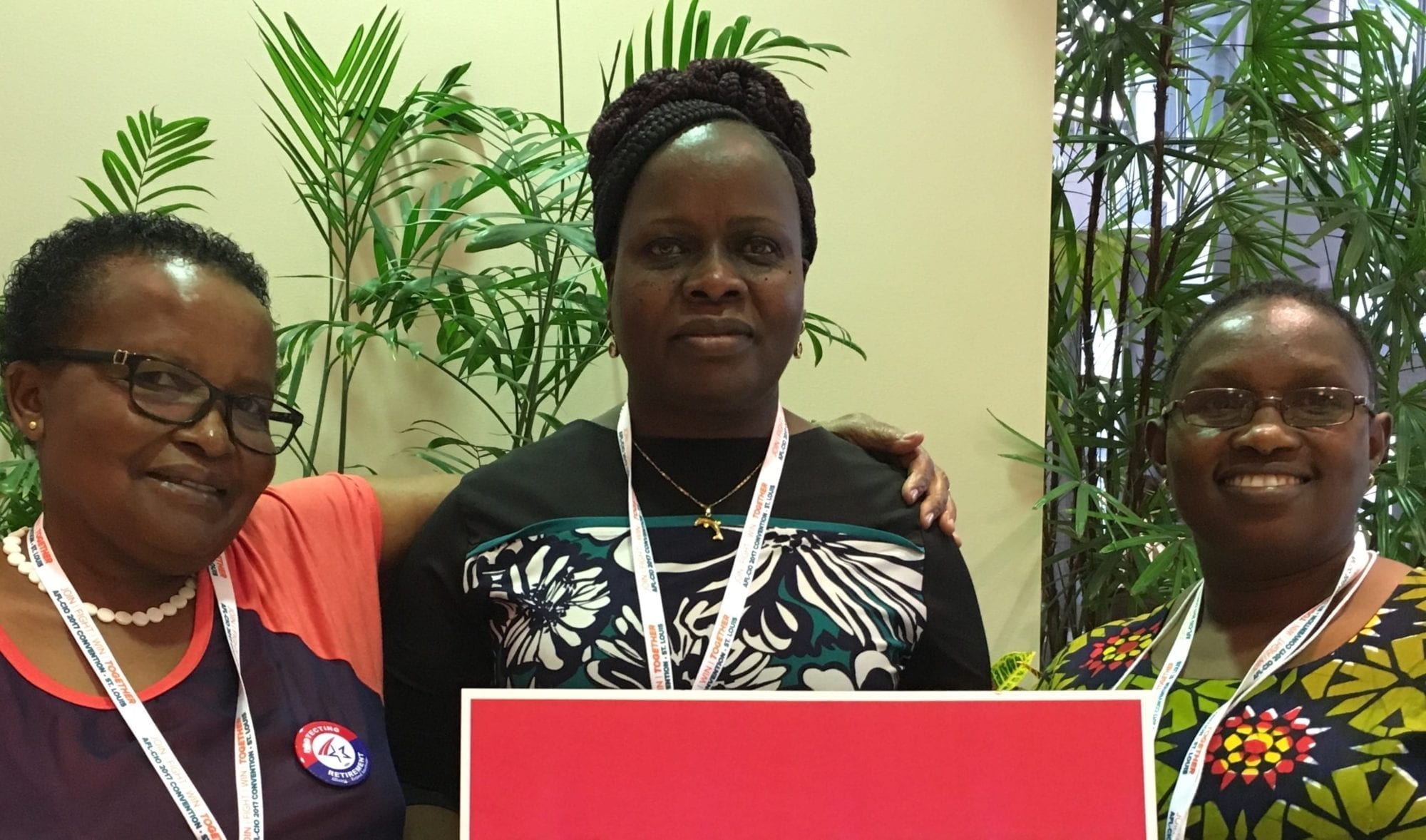When Rose Omamo started work in 1988 as a mechanic in a vehicle assembly plant in Kenya, she was one of two women in a workplace dominated by hundreds of men. Her employer refused to recognize the women’s basic requests, and even her union, the Amalgamated Union of Kenya Metal Workers, negotiated contracts that excluded their concerns.
So Omamo took action. She demanded her employer provide breastfeeding accommodations for women workers and such fundamental workplace amenities as sanitary receptacles in the restrooms. Soon, she was elected union shop floor leader, and after winning a series of increasingly high positions, now holds the highest office, general secretary, in the 11,000-member national Metal Workers union. Omamo also is national chair of the Congress of Trade Unions–Kenya (COTU-K) Women’s Committee and serves on the COTU-K executive board.
Her male co-workers saw “I could fight for the men, and they put their trust in me,” she says.

Women, race and youth are all crosscutting issues about workers who are most oppressed.—Rosana Fernandes, Brazil CUT. Credit: Solidarity Center/Tula Connell
Halfway across the globe in Brazil, Rosana Fernandes began working at age 22 at a plastics product factory in São Paulo, where she quickly ran for leadership in her factory union and soon was elected to a top-level position at the national Central Union of Workers (CUT). There, she created the Collective of Chemical Youth Workers section to advance the interests of young workers in her industry.
Now deputy secretary of CUT’s Secretariat of Combating Racism, Fernandes says the issues she has worked on as a union leader—women, race and youth—are all “crosscutting policies about workers who are most oppressed.”
Omamo and Fernandes are two of a 20-member Solidarity Center Exchange Program delegation of women union leaders from Kenya and Brazil here in St. Louis for the AFL-CIO 2017 Convention. While in St. Louis, the group will meet with Mayor Lyda Krewson, the city’s first female mayor, and will travel to Atlanta, where they will explore with leaders from U.S. unions and nonprofits their strategies for empowering women within their organizations.
On the Frontlines for Vulnerable Workers
Leaders in their unions, Omamo and Fernandes also are frontline advocates for empowering women and young workers to take roles in their unions.
“Most of labor move leadership is male dominated,” Omamo says. “What I have come to realize, personally, is that the biggest challenge has been, ‘How can a male trust a woman to lead them?’”
When Omamo ran for national office in April 2016, her slate included two other women, who ran for treasurer and assistant treasurer. Both were elected. “Now we have shop stewards in unions and branch officials and national officials” who are women, she says.
From the national union level, Fernandes has advocated for broader and deeper inclusion of young workers. “We must effectively incorporate youth into policies in way that renews the union movement,” Fernandes says, speaking through a translator. “Society is constantly changing itself and unions need to keep up. We need policies that are not just for youth but with youth.”
Global Solidarity to Achieve Global Goals
In her 17 months as general secretary of the Metal Workers union, Omamo has initiated trainings across the union’s 11 branches in dispute resolution, labor law, grievance handling and collective bargaining negotiating. The workers, many of whom are illiterate, are now effectively negotiating collective bargaining agreements for the first time without national union participation.
“We need to give them tools and skills to be able to represent workers effectively on the shop floor,” she says. She also has streamlined operations and tackled the union’s debt, reducing it from 4.5 million Kenya shillings ($43,200) to 1.2 million Kenya shillings ($11,520).
In Brazil, where Afro-Brazilian workers are disproportionately paid less and work in the most dangerous jobs with little job security, Fernandes is now focused on creating fair playing fields for racially disadvantaged workers.
“It’s very clear racial equality is not alive in labor market,” Fernandes says. For instance, the country’s 8 million domestic workers are overwhelming Afro-Brazilian, “a legacy from slavery that work in the home should be automatically done by black women who don’t deserve to have decent wages or (decent) working conditions,” she says. “It’s 2017, and we’re still fighting for fundamental rights for domestic workers.”
For both women leaders, global solidarity is essential to address the common struggles in their countries and around the world.
“It’s also time for us to unite together to fight together to work together in solidarity and to say we want to change the world of work so that the work that will be done by our members will be decent and not precarious,” says Omamo.
And like all the women on the Solidarity Center delegation, Omamo is ready for the challenge.
As she puts it: “I don’t believe in failing, I believe in achieving.”

